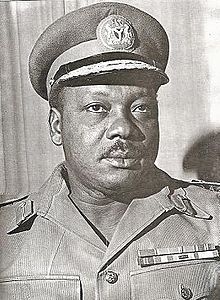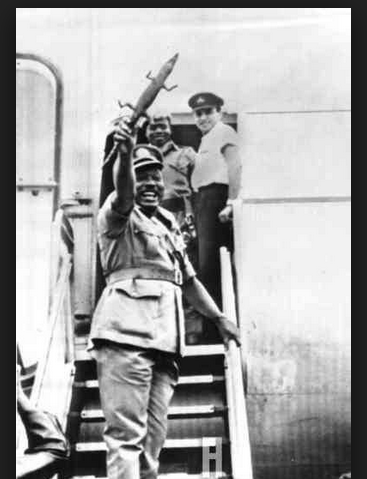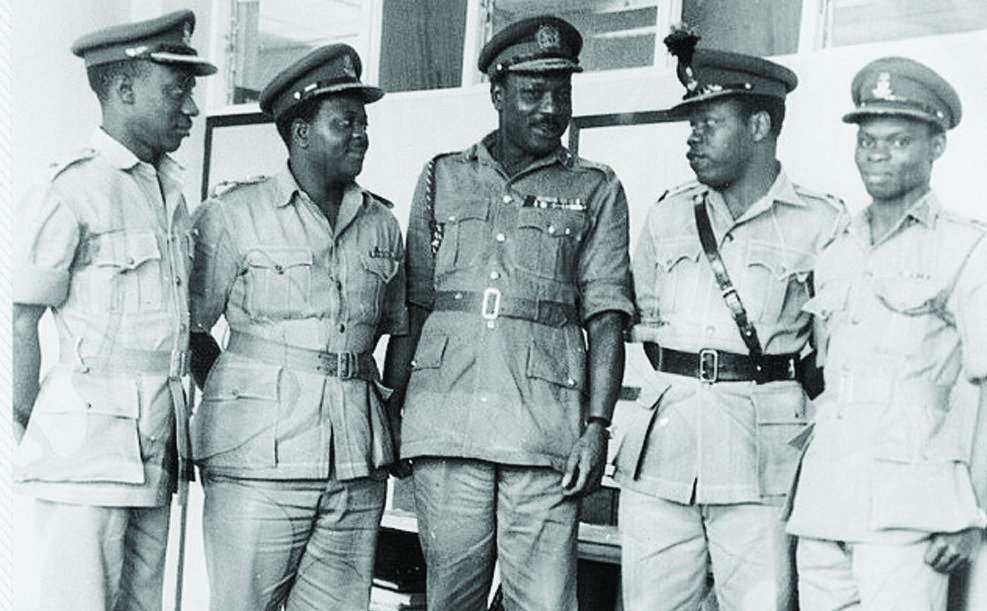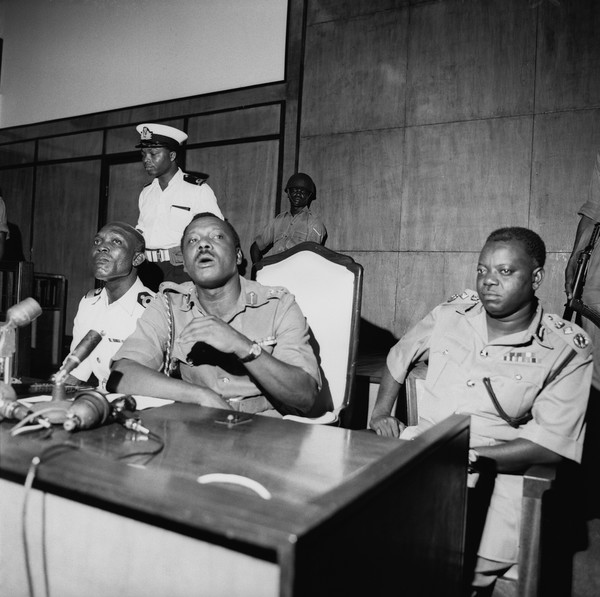 Johnson Thomas Umunnakwe Aguiyi-Ironsi (3 March 1924 – 29 July 1966) was a senior Nigerian military officer and the first Nigerian Military Head of State. He seized power in the ensuing chaos following the 15 January 1966 military coup, serving as the Nigerian Head of State from 16 January 1966 until his murder on 29 July 1966 by a group of mutinous Northern army soldiers who revolted against his government in what was popularly called the July Counter Coup.
Johnson Thomas Umunnakwe Aguiyi-Ironsi (3 March 1924 – 29 July 1966) was a senior Nigerian military officer and the first Nigerian Military Head of State. He seized power in the ensuing chaos following the 15 January 1966 military coup, serving as the Nigerian Head of State from 16 January 1966 until his murder on 29 July 1966 by a group of mutinous Northern army soldiers who revolted against his government in what was popularly called the July Counter Coup.
Early life
Thomas Umunnakwe Aguiyi-Ironsi was born to his father Mazi (means Mister in Igbo) Ezeugo Aguiyi on 3 March 1924, in Umuahia-Ibeku, present-day Abia State, Nigeria. He was eight years old, when he moved in with his older sister Anyamma, who was married to Theophilius Johnson, a Sierra Leonean diplomat in Umuahia. Aguiyi-Ironsi subsequently took the last name of his brother-in-law as his first name, who became his father figure. At the age of 18, Aguiyi-Ironsi joined the Nigerian Army against the wishes of his sister.
Aguiyi-Ironsi had his primary and secondary school educations in Umauhia and in Kano.
In 1942, Aguiyi-Ironsi joined the Nigerian Army, at the rank of a private with the seventh battalion. He got promoted in 1946 to the rank of company sergeant major. Also in 1946, Aguiyi-Ironsi was sent on an officer training course in Staff College, Camberley, England. In 1949, after completion of his course at Camberley, he was promoted second lieutenant of Royal West African Frontier Force.
Aguiyi-Ironsi was promoted to captain in 1953 and again promoted to Major in 1955. He was part of the officers who served as Queen Elizabeth II of the United Kingdom and Nigeria’s equerry at the time she visited Nigeria in 1956.
 In 1960, Aguiyi-Ironsi was made commandant of the fifth battalion in Kano, Nigeria, with the rank of lieutenant colonel
In 1960, Aguiyi-Ironsi was made commandant of the fifth battalion in Kano, Nigeria, with the rank of lieutenant colonel
Later in 1960, he headed the Nigerian contingent force of the United Nation peace keeping force in the Congo (now Zaire). From 1961-1962, Aguiyi-Ironsi served as the military attaché to the Nigeria High Commission in London United Kingdom. During this period he was promoted to the rank of brigadier general and during his tenure as military attaché he attended some courses at the Imperial Defence college (renamed Royal College of Defence Studies in 1970), Seaford House, Belgrave Square.
In 1964 he was appointed at the commandant of the entire United Nations peace keeping forces in the Congo (Zaire).
In 1965, Aguiyi-Ironsi was promoted to the rank of major general. that same year major general CB Welby-Everard handed over his position as the general officer Commanding, GOC of the entire Nigerian Army to Major General Johnson Thomas Umunnakwe Aguiyi-Ironsi (making him the first Nigeria indigenous to head the entire Nigerian Army).
In January 1966, a group of army officers, led by Major Chukwuma Nzeogwu, overthrew the central and regional governments of Nigeria, killed the prime minister, and tried to take control of the government in a failed coup d’état. Nzeogwu was countered, captured and imprisoned by major general Johnson Aguiyi-Ironsi.
Aguiyi-Ironsi was named military head of state on 17 January 1966, a position he held until 29 July 1966, when a group of northern army officers revolted against the government, and killed Aguiyi-Ironsi.
 Fall of the First Republic
Fall of the First Republic
On 14 January 1966, Soldiers of mostly Igbo extraction led by Major Chukwuma Kaduna Nzeogwu, an Igbo from Okpanam near Asaba, present day Delta state, eradicated the uppermost echelon of politicians from the Northern and Western provinces.This and other factors effectively led to the Fall of the Republican Government. Though Aguiyi-Ironsi, an Igbo, was purportedly slated for assassination, he effectively took control of Lagos, the Federal Capital Territory. With President also an Igbo Nnamdi Azikiwe refusing to intervene and insure the continuity of civilian rule, Aguiyi-Ironsi effectively at Gun point forced the remaining members of Balewa’s Government to resign, he then made the Senate president Nwafor Orizu, another Igbo who was serving as acting president in Azikiwe’s absence, to officially surrender power to him, staging a coup of his own and ending the First Nigerian Republic.
Head of state
194 days in office
Aguiyi-Ironsi inherited a Nigeria deeply fractured by its ethnic and religious cleavages. The fact that none of the high-profile victims of the 1966 coup were of Igbo extraction, and also that the main beneficiaries of the coup were Igbo, led the Northern part of the country to believe that it was an Igbo conspiracy. Though Aguiyi-Ironsi tried to dispel this notion by courting the aggrieved ethnic groups through political appointments and patronage, his failure to punish the coup plotters and the promulgation of the now infamous “Decree No. 34″—which abrogated the country’s federal structure in exchange for a unitary one— crystallized this conspiracy theory.
During his short regime Aguiyi-Ironsi promulgated a raft of decrees. Among them were the Constitution Suspension and Amendment Decree No.1, which suspended most articles of the Constitution (though he left intact those sections of the constitution that dealt with fundamental human rights, freedom of expression and conscience were left intact). The Circulation of Newspaper Decree No.2 which removed the restrictions on press freedom put in place by the preceding civilian administration. According to Ndayo Uko, the Decree no.2 was to serve “as a kind gesture to the press..” to safeguard himself when he went on later to promulgate the Defamatory and Offensive Decree No.44 of 1966 which made it an “offense to display or pass on pictorial representation, sing songs, or play instruments the words of which are likely to provoke any section of the country.” He also as per the proposals of a single man committee passed the controversial Unification Decree No. 34 aimed to unify Nigeria into a unitary state.
 Counter coup and assassination
Counter coup and assassination
On 29 July 1966 Aguiyi-Ironsi spent the night at the Government House, Ibadan, as part of a nationwide tour. His host, Lieutenant Colonel Adekunle Fajuyi, Military Governor of Western Nigeria, alerted him to a possible mutiny within the army. Aguiyi-Ironsi desperately tried to contact his Army Chief of Staff, Yakubu Gowon, but he was unreachable. In the early hours of the morning, the Government House, Ibadan, was surrounded by soldiers led by Theophilus Danjuma. Danjuma arrested Aguiyi-Ironsi and questioned him about his alleged complicity in the coup, which saw the demise of the Sardauna of Sokoto, Ahmadu Bello. The circumstances leading to Aguiyi-Ironsi death still remain a subject of much controversy in Nigeria. His body and that of Fajuyi were later discovered in a nearby forest.
Legend
The swagger stick with a stuffed crocodile mascot carried by Aguiyi-Ironsi was called “Charlie”. Legend had it that the crocodile mascot made him invulnerable and that it was used to dodge or deflect bullets when he was on mission in the Congo. Despite the stories, the crocodile mascot probably had something to do with the fact that the name “Aguiyi” translates as “crocodile” in Igbo.
Personal life
Johnson Aguiyi-Ironsi was married to his wife Victoria in 1953. Aguiyi-Ironsi’s son, Thomas Aguiyi-Ironsi, was appointed to the position of Nigeria’s Defence Minister on 30 August 2006 – forty years after his father’s death.
Award
Gallantry medal (was awarded by the Austrian Government to Lt Col Aguiyi-Ironsi, Maj Njoku, two expatriates and twelve Nigerian soldiers for their role in the Congo in 1960, in freeing an Austrian ambulance unit which was arrested and imprisoned by the Congolese authorities because they claimed the unit were Belgian parachutists).








great Biography there. educative